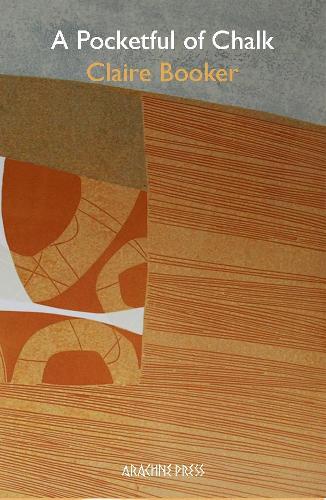
Brighton-based poet and playwright, Claire Booker’s debut pamphlet of poems, ‘Later There Will Be Postcards’ was published by Green Bottle Press. A further pamphlet, ‘The Bone That Sang’ was published by Indigo Dreams. She was a recipient of a Kathak International Literary Award in 2019 and, in the same year, travelled to Bangladesh as a guest poet at the Dhaka International Writers’ Festival. Her stage plays have been performed in Europe, Australia, America and the UK. She is a member of the Brighton Stanza Group.
Titles can be magical as well as memorable. Following in the footsteps of Agatha Christie’s detective novel, ‘A Pocketful of Rye’, Aisha Bushby’s novel ‘A Pocketful of Stars’ and Richard E Grant’s memoir ‘A Pocketful of Happiness’ we now have Booker’s first full-length collection ‘A Pocketful of Chalk’.
Of course, a ‘pocket’ can also be a seam, a cavity in a rock or stratum filled with ore or other material as opposed to a small patch of land or a space for carrying small articles in one’s clothing. In this collection, Booker digs deep beneath the surface to mine a rich vein of poetry from the chalk deposits of the South Downs. It is here where we see that Booker is very much a poet of place as she takes us over a range of coastal cliffs and hills such as Beachy Head, Folly Hill, and Beacon Hill to the inland grasslands and meadows of Sussex which are all very much a part of her landscape.
In an interview for The Poet Magazine, Booker says ‘I think words, for me, are often a way to delve into the unexplored, to fling my net and see what comes up.’ Nowhere is this more obvious than in her opening poem, ‘Breaking Out’, where space is used instead of punctuation to indicate the length of a pause. The full-stop (‘I’ve had it with full stops’) is not permitted to put in an appearance until the whole poem has ended, allowing nothing to hinder the full flight of her imagination, a dazzlement of constellations, butterflies, marigolds and dandelions. The lyrical drive inherent in this and many other poems in the collection comes from Booker’s love of English hymnody.
By contrast, full stops are very much in evidence in ‘Looking Towards Smock Hill’ where short sentences help to drive the poem forward, enabling it to cover a lot of ground, giving us a sense distance in the view out to sea.
In ‘Drone Boys’ technology meets sheep. The sound and sight of them scything the air with their blades is distressing to the sheep. Reading it put me in mind of the dangers birds face when confronted with the whirling blades of wind turbines. Booker handles the clash of forces between machinery and the natural world very convincingly here. We ignore the needs of the natural world at our peril.
‘Long Man Dreaming’ is central to this collection. This is the chalk giant, known as the Long Man of Wilmington that is carved into the Sussex Downs. The jury is still out as to whether it is a guardian, some kind of war-god or a fertility symbol and its origins are unclear. The narrator imagines the giant dreaming himself back into the past to the point where the landscape returns to the seabed. Even the car the narrator is sitting in becomes a part of the transformation: ‘Inside the carburettor petrol chatters /its abrasive dialect of long-dead foliage… We sink / into blue haze. A brook has begun to babble / through my head.’
Thinking of another pocketful, the nursery rhyme ‘Sing a Song of Sixpence / a pocketful of rye’ several poems bear reference to childhood such as ‘Hey Diddle Diddle…,’ ‘The Horse in my Bedroom,’ and ‘The Museum of Childhood’ where
…the little train clatters along N-gauge tracks,
disappears into the papier-mâché tunnel.
A long heart-skip, before it emerges still guarding
its secret: the dark curved space,
a pin prick of light dilating like an amazed pupil
at the approaching world.
Even the name of the gardener in ‘Mr McGregor’s Seedlings’ is a distant echo from Beatrix Potter’s ‘The Tale of Peter Rabbit’.
In ‘Italian Hair’ Booker manages to convey a whole spectrum of moods ranging from envy to humour and pathos in five quatrains against a backdrop that swings between the romance of Italy to the reality of England, from Sophia Loren to the fictional character of Nora Batty.
‘Framed Woman’ is an ekphrastic poem based on a painting titled ‘Cape Cod Morning’ by the American realist painter Edward Hopper. In the actual painting, a woman is looking out of a bay window, her attention caught by something beyond the frame. She herself is framed by tall dark shutters and the shape of the oriel window. Booker focuses on the woman’s tense pose, the way her hands are ‘welded to a table’ and tells us her own take on the story of this woman and how she lives day by day in her own interior space.
‘News Flash’ reads like an intrusion into our settled lives. The violent headline haunts the narrator with endless repeats until the carefree girls playing on the beach become fully cognisant of it. The poem is the musical equivalent of the renegade snare drummer in Nielsen’s Fifth Symphony who is given the freedom to ‘improvise’ to the point of waging a war with the full forces of the rest of the orchestra.
Many of the poems in this collection are about nature but there are others which explore relationships with family and friends. Whether she is writing about a father mending nets, an osprey fledging or mirabelle plums, Booker dazzles us with her inventive vocabulary and keen observation. Highly recommended.
A Pocketful of Chalk by Claire Booker is available from Arachne Press.
You can find more work by poet and reviewer Neil Leadbeater here on Ink Pantry.

